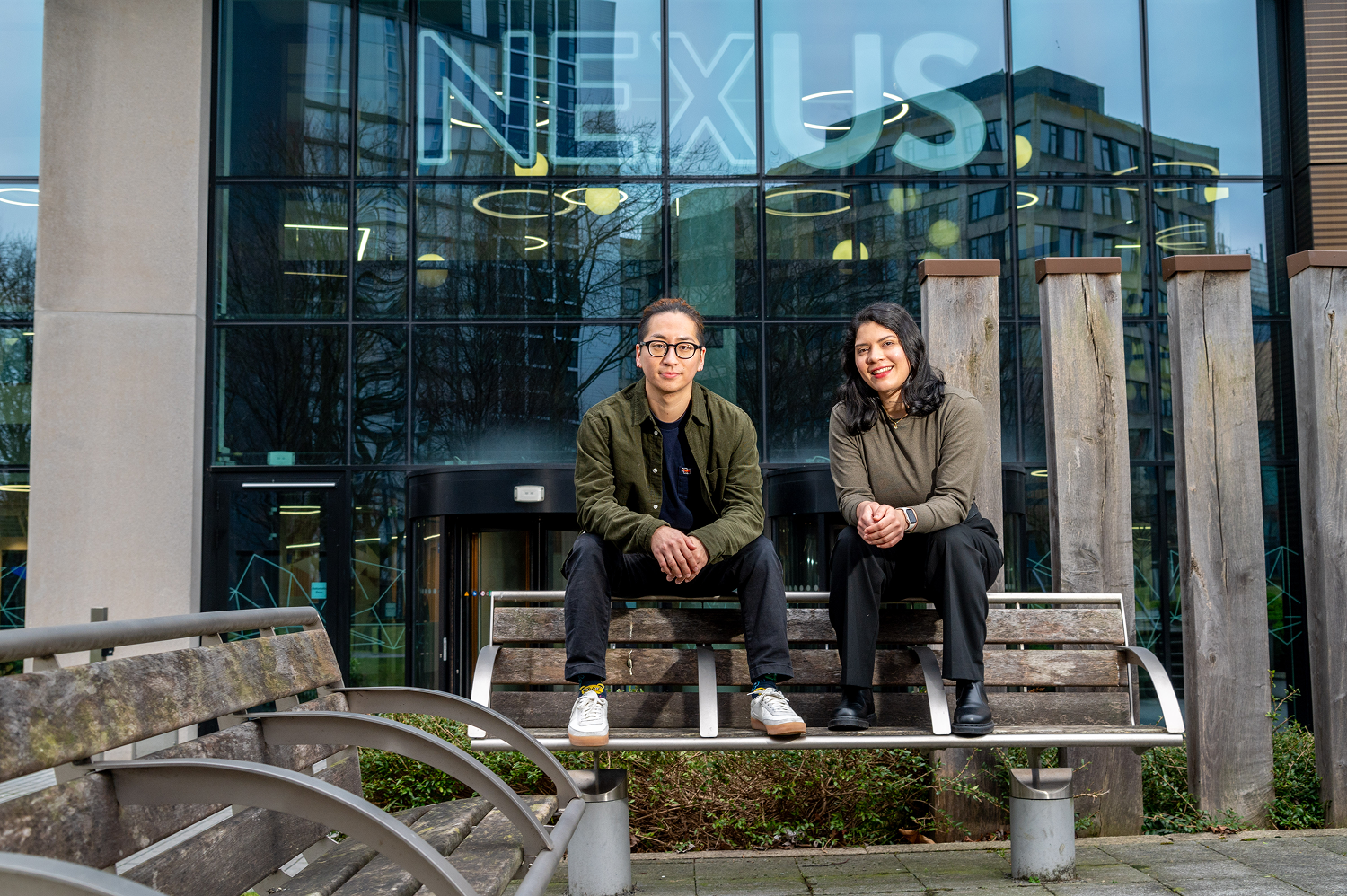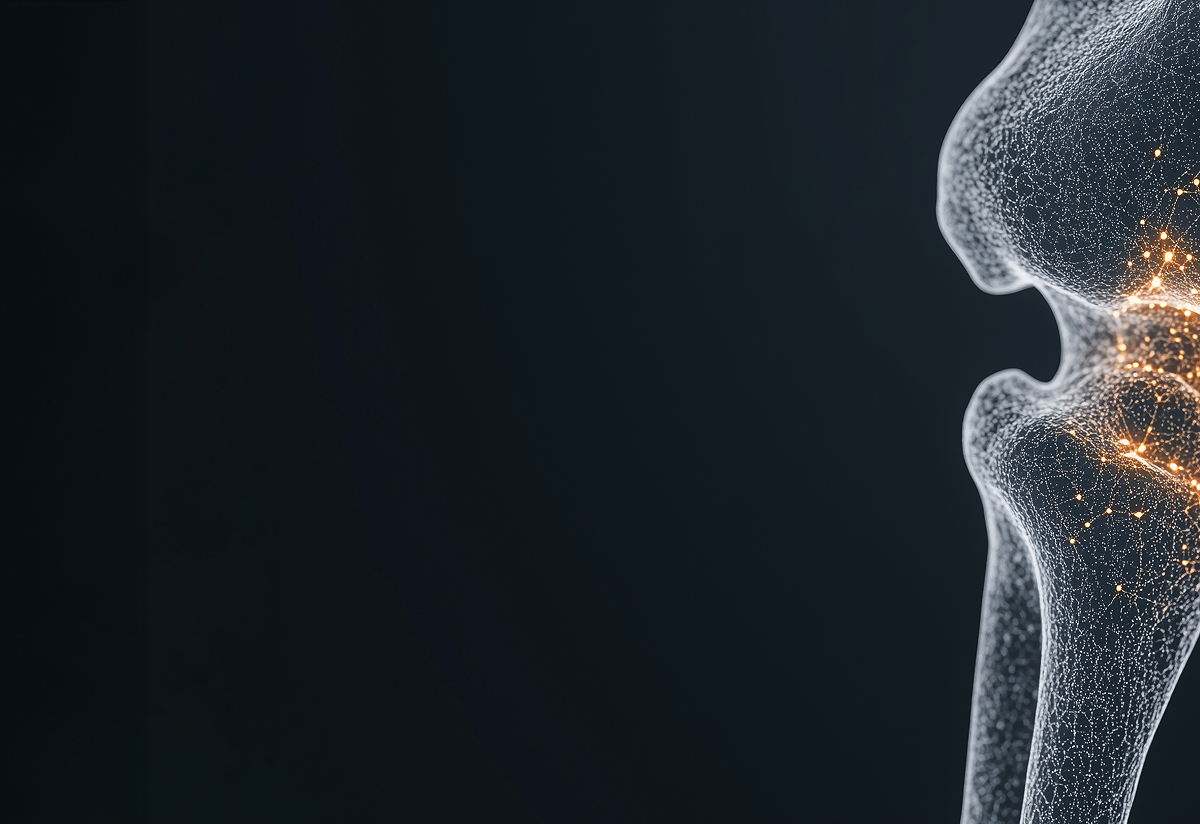Harnessing the potential of AI

When she was 18 years old, Saile Villegas (MSc Advanced Computer Science 2019) was incorrectly told she might never walk again. The life-altering misdiagnosis followed a misinterpretation of X-rays to investigate her back pain.
“But when I got a second opinion a few months down the line I was told it was an error,” she says. “The misdiagnosis – and the long wait for it to be corrected had been devastating. It played on my mind for years afterwards.”
When she sat down with fellow student Reo Ogusu (MSc Advanced Computer Science 2019) to plan life after Leeds, they decided to use their coding expertise to develop a solution – an AI system that could support medical diagnoses of bone fractures from radiographs. It would address a shortage of trained radiologists whilst making analysis quicker and more cost-effective.
“It was called Fraxpert, and it was a great idea,” says Reo. “But turning it into a business was a whole new challenge for us.”
We went from being two international students to being embraced by the entire tech community in Leeds.
When she was 18 years old, Saile Villegas (MSc Advanced Computer Science 2019) was incorrectly told she might never walk again. The life-altering misdiagnosis followed a misinterpretation of X-rays to investigate her back pain.
“But when I got a second opinion a few months down the line I was told it was an error,” she says. “The misdiagnosis – and the long wait for it to be corrected had been devastating. It played on my mind for years afterwards.”
When she sat down with fellow student Reo Ogusu (MSc Advanced Computer Science 2019) to plan life after Leeds, they decided to use their coding expertise to develop a solution – an AI system that could support medical diagnoses of bone fractures from radiographs. It would address a shortage of trained radiologists whilst making analysis quicker and more cost-effective.
“It was called Fraxpert, and it was a great idea,” says Reo. “But turning it into a business was a whole new challenge for us.”
We went from being two international students to being embraced by the entire tech community in Leeds.
Saile, from Mexico, had sat in front of Reo, from Japan, in one of their first lectures at Leeds and the two soon became good friends. “We realised we worked well together, we were always being creative and coming up with ideas,” says Reo. “We spoke about starting our own business, and discovered the University start-up service Spark was holding a business plan competition that week.”
Their application for Fraxpert was unsuccessful, but the pair knew they were onto something – and the Spark team agreed. The duo brought computer science expertise – Reo’s technical skill saw him win a prize as the top performing student on their course – and the donor-supported Spark programme showed them “how to turn that into a business”.
Spark helped the pair develop a comprehensive business plan, guided them with visa applications, provided proof-of-concept funding, and gave them an office space in the campus innovation hub NEXUS for their business Seeai.
Saile and Reo enlisted the help of former lecturers in the School of Computing, Masters students at Leeds and the Spark team to develop the product – but they would still need access to patient data so Fraxpert could learn what a fracture looked like.
“That’s when NHS Scotland made a grant callout for exactly our product,” says Saile. “The winner would have access to patient data and radiologists. So of course we applied.”
From over 100 applicants – many large, established tech businesses – they were offered the contract.
“I think we were naïve in assuming we would win it, but we did,” says Saile. “We stood out for our passion for what we were doing. We travelled to Aberdeen each week, a six-hour journey, to work with the doctors and refine the project to meet NHS needs. We trained Fraxpert like you’d train a doctor to recognise fractures. By the end, it could detect as well as a radiologist, giving a fast and accurate interpretation.”
Once the contract was complete, because of the long waiting list for regulatory approval and shifting NHS priorities following Covid-19, the team decided not to take Fraxpert to the market – but the experience proved invaluable in kickstarting Seeai as a business.
Now, the pair use their expertise to help clients expand and improve processes and unlock the value of technology. From their Leeds office, Seeai has gone on to work on over 50 projects across industries – including aviation, insurance, billboard advertising, construction and manufacturing. They solve problems by developing a new AI product – or sometimes, without using AI at all.
That, Saile suggests, is important. “You can’t force it. You should only use AI where it’s actually needed. Using products like ChatGPT for everything does not necessarily make things better.
“Our offer isn’t just about implementing AI. It’s our expertise and creativity as a duo. We combine insights, research and innovation to find tailored solutions and improve processes, however that might look.”
In a recent project, a US client challenged Seeai to streamline a process which required two individuals to assess over 10,000 rows of purchasing lists in Excel. The automated solution Saile and Reo developed ran with the click of a button. “That was a cool one,” says Reo. “We freed up their time and created an error-free process. The client raised $1 million to scale the product.”
Saile was recently named one of Innovate UK’s Women in Innovation Award winners in recognition of her contribution to the tech industry. This continuing success comes as UK Prime Minister Sir Keir Starmer (Law 1985, Hon LLD 2012) unveiled government plans to make Britain into “one of the great AI superpowers”.
Such promises might tempt tech entrepreneurs to head for London, but Reo and Saile are staying in Leeds. They regularly speak in panel discussions, attend events, and play a key role at the annual Leeds Digital Festival. “We went from being two international students to being embraced by the tech community in Leeds,” says Saile.
“Leeds is a hidden gem for tech companies at such an exciting time,” says Reo. “AI is a disruptive technology, and it’s transformative in making companies more productive. It’s changing the world as we speak.
“Leeds and its supporter community helped us to become a part of that.”
Saile, from Mexico, had sat in front of Reo, from Japan, in one of their first lectures at Leeds and the two soon became good friends. “We realised we worked well together, we were always being creative and coming up with ideas,” says Reo. “We spoke about starting our own business, and discovered the University start-up service Spark was holding a business plan competition that week.”
Their application for Fraxpert was unsuccessful, but the pair knew they were onto something – and the Spark team agreed. The duo brought computer science expertise – Reo’s technical skill saw him win a prize as the top performing student on their course – and the donor-supported Spark programme showed them “how to turn that into a business”.
Spark helped the pair develop a comprehensive business plan, guided them with visa applications, provided proof-of-concept funding, and gave them an office space in the campus innovation hub NEXUS for their business Seeai.
Saile and Reo enlisted the help of former lecturers in the School of Computing, Masters students at Leeds and the Spark team to develop the product – but they would still need access to patient data so Fraxpert could learn what a fracture looked like.
“That’s when NHS Scotland made a grant callout for exactly our product,” says Saile. “The winner would have access to patient data and radiologists. So of course we applied.”
From over 100 applicants – many large, established tech businesses – they were offered the contract.
“I think we were naïve in assuming we would win it, but we did,” says Saile. “We stood out for our passion for what we were doing. We travelled to Aberdeen each week, a six-hour journey, to work with the doctors and refine the project to meet NHS needs. We trained Fraxpert like you’d train a doctor to recognise fractures. By the end, it could detect as well as a radiologist, giving a fast and accurate interpretation.”

Once the contract was complete, because of the long waiting list for regulatory approval and shifting NHS priorities following Covid-19, the team decided not to take Fraxpert to the market – but the experience proved invaluable in kickstarting Seeai as a business.
Now, the pair use their expertise to help clients expand and improve processes and unlock the value of technology. From their Leeds office, Seeai has gone on to work on over 50 projects across industries – including aviation, insurance, billboard advertising, construction and manufacturing. They solve problems by developing a new AI product – or sometimes, without using AI at all.
That, Saile suggests, is important. “You can’t force it. You should only use AI where it’s actually needed. Using products like ChatGPT for everything does not necessarily make things better.
“Our offer isn’t just about implementing AI. It’s our expertise and creativity as a duo. We combine insights, research and innovation to find tailored solutions and improve processes, however that might look.”
In a recent project, a US client challenged Seeai to streamline a process which required two individuals to assess over 10,000 rows of purchasing lists in Excel. The automated solution Saile and Reo developed ran with the click of a button. “That was a cool one,” says Reo. “We freed up their time and created an error-free process. The client raised $1 million to scale the product.”
Saile was recently named one of Innovate UK’s Women in Innovation Award winners in recognition of her contribution to the tech industry. This continuing success comes as UK Prime Minister Sir Keir Starmer (Law 1985, Hon LLD 2012) unveiled government plans to make Britain into “one of the great AI superpowers”.
Such promises might tempt tech entrepreneurs to head for London, but Reo and Saile are staying in Leeds. They regularly speak in panel discussions, attend events, and play a key role at the annual Leeds Digital Festival. “We went from being two international students to being embraced by the tech community in Leeds,” says Saile.
“Leeds is a hidden gem for tech companies at such an exciting time,” says Reo. “AI is a disruptive technology, and it’s transformative in making companies more productive. It’s changing the world as we speak.
“Leeds and its supporter community helped us to become a part of that.”